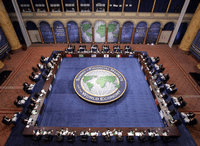The notion that the underlying distribution of global power is shifting from West to East and from North to South is not new. For more than a decade, astute observers have noted that countries like China, Brazil and India, among others, were consistently posting impressive economic growth rates and closing the gap separating them from the advanced industrial economies. Yet, even as the reality of their economic rise was impossible to dispute, the structures of global financial governance did not adapt to reflect these changes. Of course, this is not surprising, as international institutions are notoriously resistant to reform.
As is often the case, it took a crisis to bring about change -- an event so catastrophic that it upended the decades-long equilibrium. That event came in the fall of 2008, when the world economy found itself in the throes of the worst financial crisis in 80 years. The advanced industrial countries were forced to recognize that they could no longer effectively manage the global economy without the help of emerging markets. The watershed moment came in November 2008, when then-President George Bush announced that Washington would host a summit to address the crisis not just for leaders from the Group of Eight (G-8) advanced industrial economies, but for the more diverse Group of Twenty (G-20). Since then, the G-20 has officially replaced the G-8 as the world's primary economic coordinating forum.
While the G-20 was formed all the way back in 1999 to deal with the fallout from the Asian and Russian financial crises, for years it was essentially a sideshow to the G-8. Emerging economies, although growing in stature, still did not have a seat at the "adults' table."

